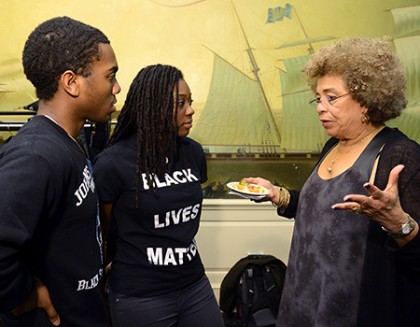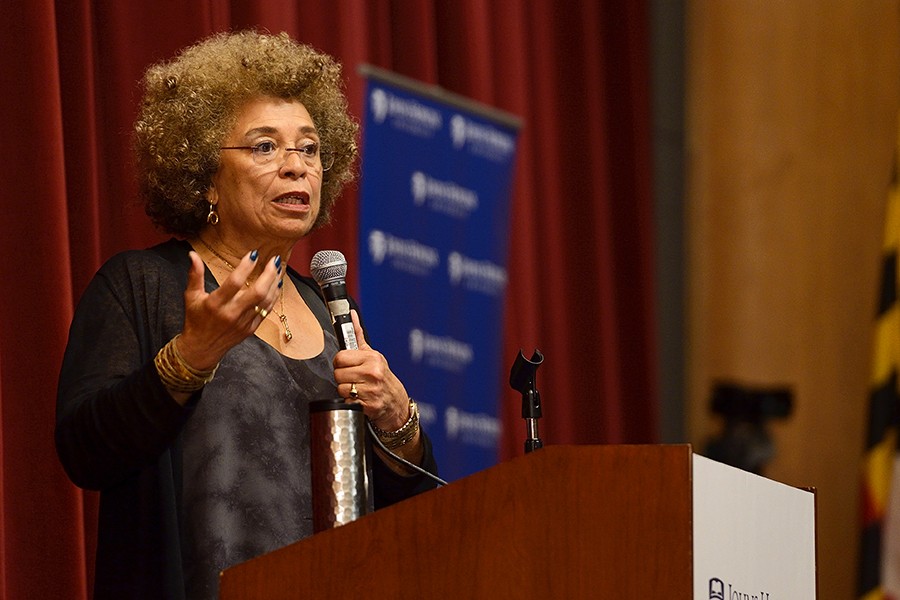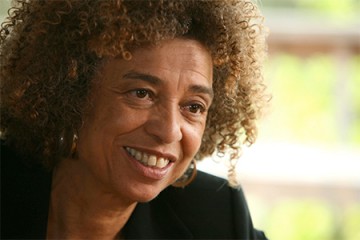In a packed assembly at Johns Hopkins University last night, activist and political scholar Angela Davis called for a wholesale dismantling of America's flawed policing and prison systems, framing that cause as central to the modern abolitionist movement.

Image caption: Angela Davis speaks with students from JHU's Black Student Union following her talk.
Image credit: Will Kirk / Johns Hopkins University
"We cannot simply call for reform," said Davis, who visited Hopkins as part of the JHU Forums on Race in America series. "We want an end to incarceration, period."
She urged for new forms of justice that "help us build a more compassionate and less violent society."
Davis traced the history of the abolitionist movement back to slavery and throughout the last century's civil rights struggles—in which she herself was famously engaged, after rising to international attention as a counterculture icon in the 1970s. In the decades since, as a writer, professor, and speaker, she's become one of the country's most outspoken intellectuals, focusing on race, feminism, and justice.
When the university announced last month that Davis would speak on campus, all tickets were claimed within an hour. More than a thousand people gathered last night to hear her speak at Shriver Hall on the Homewood campus, with many more watching from overflow viewing locations or via a live online broadcast.
Davis spoke at length about the prison-industrial complex and "the deep structural racism embedded" in America's strategies for policing and imprisonment.
"Racism continues to play a determining role in who gets stopped by the police and who doesn't," she said. "It determines who gets arrested and who goes free, who gets convicted and who is acquitted, who gets longer sentences and who gets shorter sentences." The criminal justice process is "a justice process that does appear criminal," she added, garnering applause.
Davis described the United States as a "prison nation," noting statistics cited recently by President Barack Obama that the U.S. makes up 5 percent of the world's total population yet is home to 25 percent of its prison population. While she said she supports decarceration, that solution alone, she said, won't guarantee an end to the "punitive measures of police and prisons to solve deeply ingrained social and economic problems."
She noted that jails and prisons are actually relatively new features in the context of human history. "These technologies of punishment should be considered impermanent—they have not always existed," Davis said. "If they have not always existed, then they don't have to exist in the future."
Davis folded in related themes of gay and transgender rights, the struggles of Native Americans and Palestinians, and the dangers of xenophobia, particularly today's strain of Islamophobia. Feminism was also a recurring focus. "So much damage to our movement has been done by the assumption that men are the human beings that really matter," Davis said, responding to a male audience member who wondered whether masculinity was critical to today's civil rights activism.
Davis, who was once associated with the Black Panther Party—a connection that, along with her Communist affiliation, led to her dismissal from an assistant professor position at UCLA in 1969—expressed optimism about 21st-century activism.
With the public outrage over recent high-profile incidents of police brutality—including the death of Freddie Gray in Baltimore—has come a wave of "new movements [that] have embraced abolitionism," she said, referencing the Black Lives Matter movement, the Black Youth Project 100, and the Dream Defenders.
Davis, who just turned 72, recently spent time in Miami with the Dream Defenders, a group created in response to the shooting death of Trayvon Martin there.
"I felt like a new person," she said. "I think young people will help to enliven us veterans, and show us paths we wouldn't have been able to imagine on our own."
Posted in Voices+Opinion, Politics+Society
Tagged diversity, race relations, jhu forums on race in america









